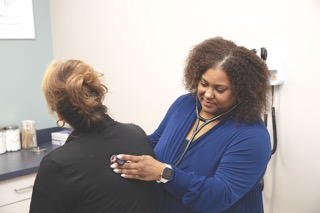Common Ground
Establishing trust with your primary care physician
How do you respond when your doctor says, “How are you?"

Do you let it all spill out, talking a mile-a-minute? Or are you reserved, sticking to short, no-nonsense answers?
Either way is just fine for Arianna Gordon, MD, of St. Joseph’s/Candler Primary Care on Eisenhower. Dr. Gordon is board-certified in family medicine.
“I’m here to be adaptable and understanding,” Dr. Gordon says. “I may have to adjust my tone or even my volume in order to meet patients where they are. My goal is to find common ground.”
That connection is not just about a pleasant experience for the patient. It is also part of building trust, which can have an impact on treatment.
“Getting on a patient’s wavelength is helpful when you are trying to get to a diagnosis,” Dr. Gordon says. “Most people like to see smiles from other people, but some patients don’t want a smile from their doctor. I’m happy to mirror what helps a patient feel more safe and more able to open up.”
Trust also tends to build through regular visits, which Dr. Gordon encourages for patients with one or more chronic diseases.

“As primary care doctors, we can help you tie everything together,” Dr. Gordon says. “For example, if you are seeing a specialist, it’s still my job to know how you are doing on the medication they prescribed and to make sure any new drugs don’t interact with your current regimen. That’s one part of treating the whole person.”
Dr. Gordon loves to educate her patients about their conditions, but she believes there’s another crucial aspect of trust—listening.
“Really listening to patients makes a big difference,” Dr. Gordon says. “It not only helps me get a diagnosis, it also makes patients feel better right there in the moment.”